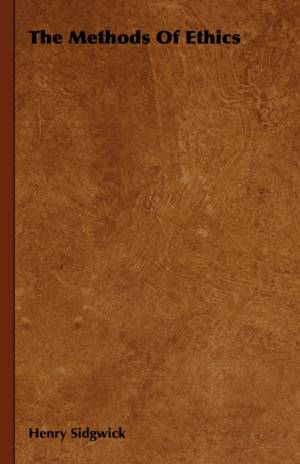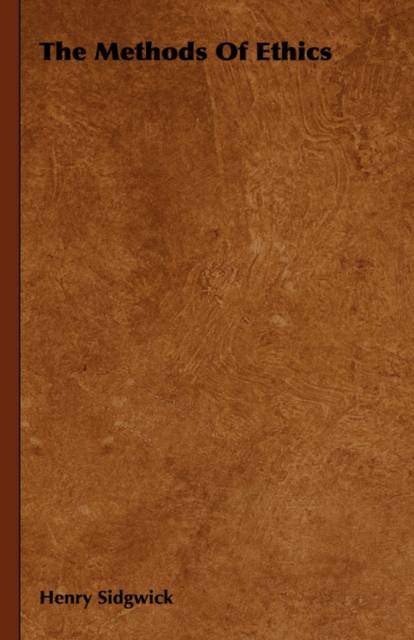
Door een staking bij bpost kan je online bestelling op dit moment iets langer onderweg zijn dan voorzien. Dringend iets nodig? Onze winkels ontvangen jou met open armen!
- Afhalen na 1 uur in een winkel met voorraad
- Gratis thuislevering in België vanaf € 30
- Ruim aanbod met 7 miljoen producten
Door een staking bij bpost kan je online bestelling op dit moment iets langer onderweg zijn dan voorzien. Dringend iets nodig? Onze winkels ontvangen jou met open armen!
- Afhalen na 1 uur in een winkel met voorraad
- Gratis thuislevering in België vanaf € 30
- Ruim aanbod met 7 miljoen producten
Zoeken
Omschrijving
THE METHODS OF ETHICS by HENRY SIDGWICK, Originally published in 1884. PREFACE: TO THE FIRST EDITION. IN offering to the public a new book upon a subject so trite as Ethics, it seems desirable to indicate clearly at the outset its plan and purpose. Its distinctive characteristics may be first given negatively. It is not, in the main, metaphysical or psychological at the same time it is not dogmatic or directly practical it does not deal, except by way of illustration, with the history of ethical thought in a sense it might be said to be not even critical, since it is only quite incidentally that it offers any criticism of the systems of indivi dual moralists. It claims to be an examination, at once expository and critical, of the different methods of obtaining reasoned convictions as to what ought to be done which are to be found either explicit or implicit in the moral consciousness of mankind generally and which, from time to time, have been developed, either singly or in combination, by indi vidual thinkers, and worked up into the systems now historical. I have avoided the inquiry into the Origin of the Moral Faculty which has perhaps occupied a dis proportionate amount of the attention of modern moralists by the simple assumption which seems to be made implicitly in all ethical reasoning that there is something 1 under any given circumstances which it is right or reasonable to do, and that this may be known. If it be admitted that we now have the faculty of knowing this, it appears to me that the investigation of the historical antecedents of this cognition, and of its relation to other elements of the mind, no more properly belong to Ethics than the corresponding questions as to the cognition of Space belong to Geometry 2 . I make, however, no further assumption as to the nature of the object of ethical knowledge and hence my treatise is not dogmatic ail the different methods developed in it are expounded and criticized from a neutral position, and as impar tially as possible. And thus, though my treatment of the subject is, in a sense, more practical than that of many moralists, since I am occupied from first to last in considering how conclusions are to be rationally reached in the familiar matter of our common daily life and actual practice still, my immediate object to invert Aristotles phrase is not Practice but Know ledge. I have thought that the predominance in the minds of moralists of a desire to edify has impeded the real progress of ethical science and that this would be benefited by an application to it of the same dis interested curiosity to which we chiefly owe the great discoveries of physics. It is in this spirit that I have endeavoured to compose the present work and with this view I have desired to concentrate the readers attention, from first to last, not on the practical results to which our methods lead, but on the methods them selves. I have wished to put aside temporarily the 1 I did not mean to exclude the supposition that two or more alternatives might under certain circumstances be equally right 1884. This statement now appears to me to require a slight modification 1884. urgent need which we all feel of finding and adopting the true method of determining what we ought to do and to consider simply what conclusions will be rationally reached if we start with certain ethical premises, and with what degree of certainty and precision. I ought to mention that Chapter iv. of Book I. has been reprinted with considerable modifications from the Contemporary Review, in which it originally ap peared as an article on Pleasure and Desire...
Specificaties
Betrokkenen
- Auteur(s):
- Uitgeverij:
Inhoud
- Aantal bladzijden:
- 540
- Taal:
- Engels
Eigenschappen
- Productcode (EAN):
- 9781443725828
- Verschijningsdatum:
- 4/11/2008
- Uitvoering:
- Hardcover
- Formaat:
- Genaaid
- Afmetingen:
- 140 mm x 216 mm
- Gewicht:
- 830 g

Alleen bij Standaard Boekhandel
+ 149 punten op je klantenkaart van Standaard Boekhandel
Beoordelingen
We publiceren alleen reviews die voldoen aan de voorwaarden voor reviews. Bekijk onze voorwaarden voor reviews.











